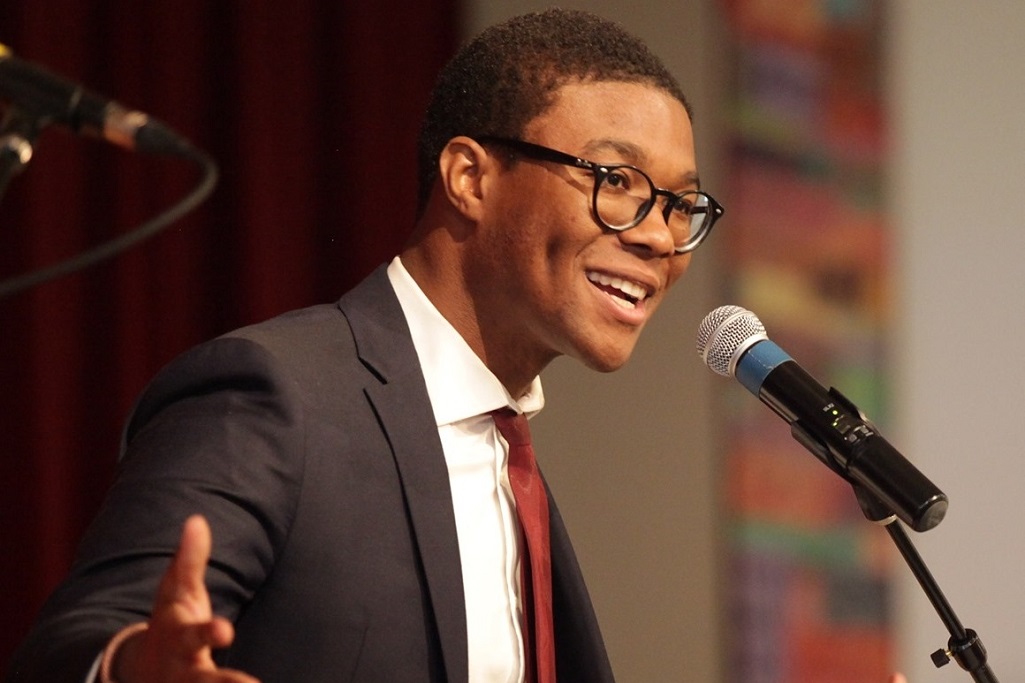For Richmond City Council candidate Allan-Charles Chipman, preserving local communitites by keeping longtime Richmonders in their homes is at the heart of the issues facing the city in 2020.
Allan-Charles Chipman is a candidate running for city council in the 6th district of Richmond against longtime incumbent Ellen Robertson, who has represented the 6th district for 16 years. The 33-year-old Chipman has a background as a community organizer and Christian faith leader, and is currently working for Initiatives of Change. If he is elected this November, it will be his first time serving in a political position. RVA Mag sat down with Chipman (over Zoom, of course) to find out some more about him, his campaign, and his opinions on the issues facing Richmond today.
RVA: How has your faith shaped your political views and your life in general?
ACC: My parents were pastors and community organizers. They were part of an organization that helped transition people out of homelessness. My parents started a school within their church that was dedicated to helping kids in the neighborhood get up to a third-grade reading level, and then send them off to public school.
I was about six years old when I was in these rooms, and I just saw how my faith calls me to help my community. Even today I work as a community advocate, really helping to expand past the societal biases that impact how people show up in their communities — like racism, dehumanization. Really, how my faith informs me is that we are not to leave behind our neighbors when they face injustice. Just as we want them fighting for us, we want to make sure we are fighting for justice, the humanity and dignity that each person’s life holds. We want to have the skillset to be able to expand the work of justice.

RVA: So you’re running primarily on an anti-gentrification platform. Can you tell us about that?
ACC: The city is really starting to recognize how unstable and unsustainable the level of growth in housing values has been. You can’t be both the arsonist and the firefighter. You can’t incentivize the type of development that has caused this burden to households. The point of entry — the price at which you can purchase a house — has risen 52 percent in the past couple of years. It’s not enough that we just talk about affordable housing, because we can’t have affordable housing being built on the displacement of long-term black neighborhoods. We can’t have this new doctrine of discovery, where people who have been indigenous to this place for a while are being displaced by this new vision of what things should be.
I’ve met people on the campaign trail who are afraid they’re gentrifiers. If people want to come into our neighborhood, that’s not a problem. I believe we can have development without displacement. But it has to be intentional. There are innovative ways that we can do that. I want to make sure we’re focused on not just making sure the next person moves in, we have to make sure we have community stabilization funds. If you look at Atlanta, Georgia, they’ve actually created something called ‘community stabilization funds’ that actually help long-term residents stay in.
We also have to realize that it’s not just seniors who are struggling. I was talking to a young woman who said she’s not sure how long she can stay in her house because of how fast housing values are escalating. We also have to make sure we’re not clearing out our low-income public housing. The RRHA’s plan is to demolish all six of the Big Six [public housing courts in the city] in 2021.
RVA: Are they actually trying to get rid of the Big Six, or just phase them out?
ACC: If you read the plan, it’s quite blatant that they’re trying to demolish them and move to a project-based voucher. They would send residents out into the private market with a voucher that doesn’t protect against discrimination. We have to be clear that we can have plans to redevelop and give people a better opportunity to live in an environment that better reflects their dignity, but we have to make sure we have a plan for where people are going. We have 300 people on a waitlist just to get housing. It’s a very concerning time in the city, and we’re already number two in the nation for the highest number of evictions.
RVA: Do you think gentrification and evictions are Richmond’s biggest problems right now?
ACC: Absolutely. We cannot build the affordable ‘RVA’ on the backs of Black Richmond. It’s not enough we have to be a city of the future, we have to be a city where people can exist in the future. If we know that what’s attracting some businesses to the city is our affordability, we can’t continue this gentrification.
This is also about being able to build generational wealth. If people lose that home, they lose the ability to pass it on to a nephew, or a family member, who might be able to use it. I was talking to an entrepreneur who said the only way he was able to start a business is because his uncle let him use his home as collateral. But if that home is no longer in the family, they no longer have access to that. We’re talking about an attack on generational wealth, an attack on housing stability. We have to have a relief fund for those who are pushed out. We don’t want people to feel guilty for coming to our city, we don’t want to make people feel that their presence means the eventual absence of others who have been here. We need to have homestead exemptions, and community stabilization funds.

RVA: How does VCU figure into the gentrification of Richmond?
ACC: There have been a lot of concerns among VCU students especially, wanting to know what the expansion of VCU has meant to the city of Richmond. We have to make sure that VCU is paying their fair share of taxes. PILOT (Payment In Lieu of Taxes) is a way our city can arrange a form of payment based on how much of their land is occupied, and it’s a way they can bring more money into the city funds.
RVA: How do you feel about the Richmond police department, especially after the protests this summer?
ACC: One of the most dangerous institutions in the world is one that doesn’t have to answer to anyone. We have seen that the police department doesn’t have to answer to anyone. Just a couple months ago the mayor made Jody Blackwell, who killed an unarmed black Air Force veteran, the police chief. We saw the police driving over protesters with no consequences. When people know that there is no accountability — this is what happens when leaders don’t stand up against the police.
We need an independent community oversight board, independent of police, to be able to police the police. We support the Marcus Alert, fully funded and led by community care units. We want to know that ethnic and racial makeup of the people who police stop, to make sure we know about racial profiling and can stop it. We also know that in Richmond City Justice Center, there is an outbreak of COVID-19. We stand with RVA26, which has been showing the horrors going on in the jail. We have to reallocate responsibilities to our community organizations, who have been having the impact that we’d like to see. I have no problem with reallocating resources to them. If police can do what they want — bend the rules, call anything that questions them an “unlawful assembly” and be able to tear gas — and we do not have leadership that challenges them, the leadership are complicit in the expansion of the corruption of the police.
RVA: What are your thoughts on the issues that face LGBTQ Virginians, especially those who are Black?
ACC: I think it’s important that we are applying a racial equity lens in everything, to make sure that the issues that face our Black LGBTQ siblings are coming to light. I’m glad that the Virginia Values Act was passed, and one of the ideas I want to bring is something called the Equity Assessment Index, which is a rubric that applies to policies that come out of City Council or City Hall, to make sure that our policies are not having a negative impact on historically marginalized communities.
There is a great level of housing discrimination that happens against LGBTQ people, and our Black and brown brothers and sisters. We have to make sure we are supporting our orgs, such as Side By Side, that deal with how many of our youth who are sent out into the streets, are disowned by their families. I want to use vacant city housing stock to bring them up and really give them a future. I want to tell them that they have a champion in me, that I’m listening. That’s why I want to start ‘Everyday Solidarity Task Forces’ that meet monthly for people to talk about what’s happening in their communities. As we try to implement the Virginia Values Act, I want to hear about places where it’s not being implemented. I want to make sure that the act is a reality in their healthcare, in their workplace.

RVA: I know that the one thing on everyone’s mind right now is the coronavirus. Is there something the city should be doing to better fight the virus?
ACC: There needs to be an eviction moratorium. We don’t have a vaccine, so the best thing we can do is shelter at home, wear a mask, and socially distance. But if you don’t have a home to shelter in, that becomes very hard to do. We need to make sure people are staying in their homes. We’re in more of a gig economy. A person may lose one job and then not qualify for a total loss of income, so they’re still drowning. We need to make sure we’re also helping people who aren’t working a 9-to-5 job.
We also need hazard pay for our public workers, and we need to make sure that they have the sick leave that they need. We have to provide safe, socially-distanced ways to help restaurants stay open — maybe having a zone for street dining. But we have to be careful, because we don’t want to go back to the more restrictive phase that crippled the economy. I think we’ve been doing well with the availability of testing. But we need to make sure we are not displacing our residents from their communities. We need to use city housing stock to make sure we’re housing as many residents as possible, really ramping up the city’s stock for emergency shelters and other ways to house people during this time. We have to do as much as we can to keep people housed, keep them safe.
All photos via Allan-Charles Chipman/Facebook. This interview was edited for length and clarity.



